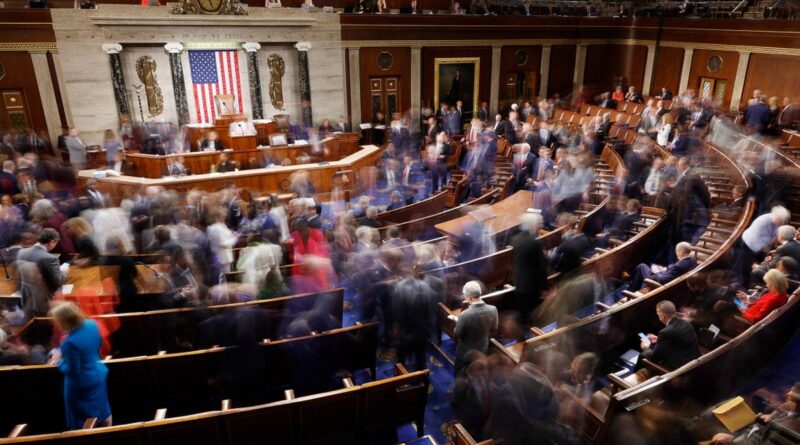Senate Revives Bill Designed to Increase Price Transparency for Event Tickets
Entertainment
The TICKET Act would introduce mandatory all-in pricing, require refunds for canceled events and ban speculative ticket sales.
Members-elect of the 118th Congress leave the House Chamber at the U.S. Capitol Building on January 03, 2023 in Washington, DC.
Chip Somodevilla/Getty Images
A ticketing reform law meant to clean up the concert industry has been revived in the U.S. Senate after nearly becoming law at the end of last year.
Originally introduced by representative Gus M. Bilirakis (R-Florida), the Transparency in Charges for Key Events Ticketing Act (TICKET Act) introduced a number of reforms to the ticket buying process. That includes rules to increase pricing transparency, requiring sports teams and concert promoters to clearly and prominently display the full price of a concert ticket with fees and taxes added so that the price they first see in the price they pay at checkout.
The TICKET Act also mandated refunds for cancelled events, banned speculative ticket sales and cracked down on the unauthorized use of venues, teams, and artists on resell sites designed to confuse fans. Born out of the bungled Taylor Swift ticket sale for her record-breaking Eras Tour – crashed by scalpers and billions of bots trying to buy up tickets to flip for profit – the Ticket Act passed the House Energy and Commerce Committee in December 2023 and passed the House in June of last year in a 344 to 24 vote. The Ticket Act was even included in the first iteration of the end-of-year Continuing Resolution spending bill signed by former president Joe Biden at the end of last year, but was eventually pulled from the CR.
Trending on Billboard
The Ticket Act died with the end of the 2023-2024 congressional term, but has been reintroduced in the U.S. Senate by senators Eric Schmitt (R-Missouri) and Ed Markey (D- Massachusetts) and heads to the Senate Commerce Committee on Wednesday (Feb 5) for a hearing.
Whether or not the TICKET Act does end up on President Donald Trump’s desk, one of its keys tenets – all-in pricing – was solidified in December by the Federal Trade Commission when it announced a rule changed tackling “junk fees.”
“People deserve to know up-front what they’re being asked to pay—without worrying that they’ll later be saddled with mysterious fees that they haven’t budgeted for and can’t avoid,” former FTC Chair Lina M. Khan said on Dec. 17, hours after FTC commissioners
The Junk Fees Rule – which also applies to hotel rooms and airline fees — requires total price disclosure including fees for any event tickets listed for sale on the internet.
“The rule will make comparison shopping easier, resulting in savings for consumers and leveling the competitive playing field,” Khan said in a statement.
With the rule change in place, a recent letter to FTC by the National Independent Talent Organization urged lawmakers to urgently begin enforcing the 2016 BOTS Act after NITO members attended a ticket resale conference and “observed a sold-out exhibition hall filled with vendors selling and marketing products designed to bypass security measures for ticket purchases, in direct violation of the BOTS Act,” a Sept. 9 letter.
Since its passage in 2017, the BOTs Act has only been enforced one time, in 2021, wrote songwriter and music industry analyst Chris Castle at the time, arguing that the government needed to focus on enforcing its existing laws on the books before moving on to a new regime of legislation that will ultimately go “under-enforced.”
Daily newsletters straight to your inbox
Sign Up
More From Pro

